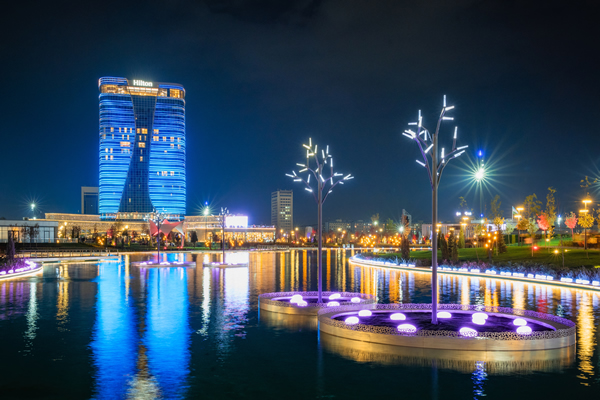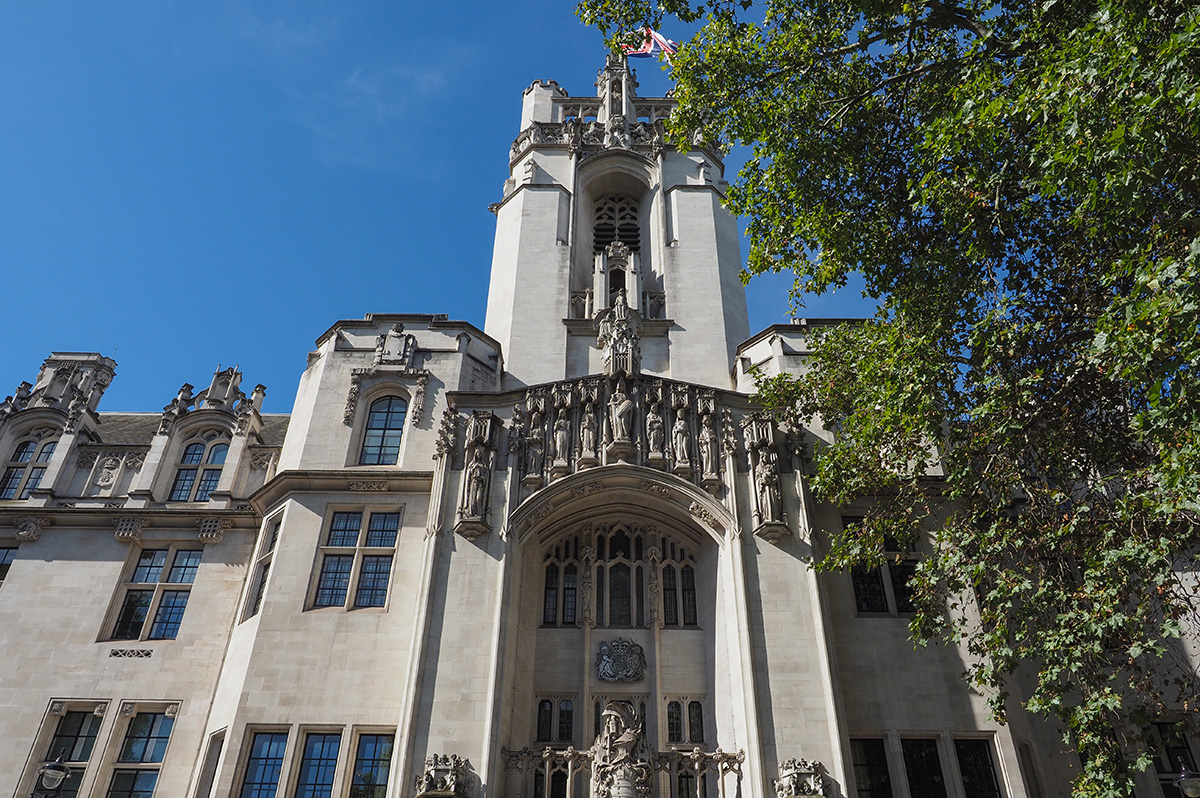World
LGBTQ activism in Uzbekistan ‘is almost impossible’
Human rights activist speaks after call to end so-called anal tests

A human rights activist in Uzbekistan says LGBTQ people in their country continue to live in fear.
“Members of the LGBT community continue to be intimidated,” the human rights activist told the Washington Blade this week. “Activism and protection of the rights of LGBT representatives is almost impossible in the country.”
“There are no mechanisms that would somehow help people who are already in a complex psycho-emotional state,” added the human rights activist. “It is not possible to ask for help if you suffered on the basis of your sexual orientation; either from law enforcement agencies, doctors, psychologists or other structures that should provide this assistance.”
Uzbekistan is among the dozens of countries in which consensual same-sex sexual relations remain criminalized.
Human Rights Watch; the Council for Global Equality; the Eurasian Coalition on Health, Rights, Gender and Sexual Diversity; Freedom Now; Human Dignity Trust; the Human Rights Campaign; ILGA-Europe; the International Partnership for Human Rights and the Lesbian and Gay Federation in Germany in an Aug. 5 press release noted Uzbek authorities between 2017 and this year have subjected at least six men to so-called anal exams to prove they engaged in consensual same-sex sexual relations. The groups urged President Shavkat Mirziyoyev to immediately ban this practice.
“Forced anal examinations, and their use in seeking convictions for consensual same-sex conduct, are an appalling violation of basic rights that diminishes Uzbekistan’s efforts to make its poor human rights record a thing of the past,” said Human Rights Watch Associate LGBT Rights Director Neela Ghoshal in the press release. “The Uzbek government has been vocal about its intent to make human rights reforms, yet persists in using a discredited, abusive procedure that amounts to torture.”
The human rights activist spoke with the Blade days after Human Rights Watch and the other groups urged the Uzbek government to ban anal exams. The Blade on Thursday reached out to the Uzbek government, the Uzbek Embassy in D.C. and Uzbek Ambassador to the U.S. Javlon Vakhabov for comment.
This is Michael Lavers from the @WashBlade in the U.S. Does @govuz have any comment on the Human Rights Watch report on forced anal testing in homosexuality prosecutions? https://t.co/at7uEKdQBm @Dunyo_IA @UZEmbassyDC @JavlonVakhabov @usembtashkent
— Michael K. Lavers (He/Él) (@mklavers81) August 12, 2021
Uzbekistan is a former Soviet republic in Central Asia that borders Kazakhstan, Kyrgyzstan, Tajikistan, Turkmenistan and Afghanistan. Mirziyoyev has been Uzbekistan’s president since 2016.
The human rights activist — who asked the Blade not to publish their name — said Mirziyoyev promised “radical changes in all areas, especially in the field of human rights.”
“The entire world community, like the entire population of Uzbekistan, expected global changes in these areas, but almost five years have passed since he has been in power and much that was promised was simply forgotten or rejected under various pretexts,” said the human rights activist. “During all five years of government as president in the field of LGBT rights, nothing was done except aggravating the situation and worsening the situation of the LGBT community in Uzbekistan.”
The human rights activist noted Article 120 of the Uzbek penal code “is directed primarily against men, but the presence of an article in society is perceived as a ban on the entire LGBT community.” They also said efforts to decriminalize homosexuality in Uzbekistan have been “rejected, citing the thinking of civil society.”
The human rights activist told the Blade that prominent politicians and religious officials in their country publicly say LGBTQ people should undergo treatment, lose their citizenship and be destroyed.
A new criminal code that Uzbek lawmakers approved in February contains a provision that addresses “crimes against morals, youth and family.” The human rights activist with whom the Blade spoke sarcastically said “it turns out that the LGBT community in the country is the culprit of problems in families, in young people.”
“Representatives of the LGBT community in Uzbekistan have no protection and no rights,” said the human rights activist. “In addition, the lack of support from civil society, the imposition of a negative image of the LGBT community on people deprive them of the support of civil society, because people have been introduced to the idea that if you are willing to help the LGBT community, then you are necessarily part of them and should be subject to punishment.”
“Open homophobia and unleashed hands of law enforcement agencies allow the use of any methods of pressure and torture on people who are charged under Article 120, because no one will help in this situation,” added the human rights activist.
The human rights activist told the Blade that they welcome the call for Mirziyoyev to ban anal tests in Uzbekistan. The human rights activist added they are hopeful the U.S. and European Union can potentially spur Mirziyoyev’s government to do more to protect LGBTQ Uzbeks.
“The hope of the LGBT community of Uzbekistan is connected precisely with the possibility of influence from the government of America and the European Union on this issue,” said the human rights activist, while adding the pandemic has forced the U.S. and European countries to shift their priorities.
The human rights activist noted Uzbekistan is a member of the U.N. Human Rights Council and “has undertaken to promote and protect human rights and to adopt a number of legislative, institutional and administrative measures to fulfill its international human rights obligations, and has undertaken to protect, promote and uphold universal human rights and fundamental freedoms for all.”
The human rights activist also pointed out the EU does not impose tariffs on goods it imports from Uzbekistan.
“The EU made concessions to Uzbekistan in this matter when it gave it the status of its partner,” they noted. “But at the same time Uzbekistan is not confused in fulfilling its obligations.”
United Kingdom
UK Supreme Court rules legal definition of woman limited to ‘biological women’
Advocacy groups say decision is serious setback for transgender rights

The British Supreme Court on Wednesday ruled the legal definition of a woman is limited to “biological women” and does not include transgender women.
The Equality Act that bans discrimination based on sexual orientation and gender identity took effect in 2010.
Scottish MPs in 2018 passed a bill that sought to increase the number of women on government boards. The Supreme Court ruling notes For Women Scotland — a “feminist voluntary organization which campaigns to strengthen women’s rights and children’s rights in Scotland” — challenged the Scottish government’s decision to include trans women with a Gender Recognition Certificate in its definition of women when it implemented the quota.
Stonewall U.K., a British advocacy group, notes a Gender Recognition Certificate is “a document that allows some trans men and trans women to have the right gender on their birth certificate.”
“We conclude that the guidance issued by the Scottish government is incorrect,” reads the Supreme Court ruling. “A person with a GRC (Gender Recognition Certificate) in the female gender does not come within the definition of ‘woman’ for the purposes of sex discrimination in section 11 of the EA (Equality Act) 2010. That in turn means that the definition of ‘woman’ in section 2 of the 2018 Act, which Scottish ministers accept must bear the same meaning as the term ‘woman’ in section 11 and section 212 of the EA 2010, is limited to biological women and does not include trans women with a GRC.”
The 88-page ruling says trans people “are protected by the indirect discrimination provisions” of the Equality Act, regardless of whether they have a Gender Recognition Certificate.
“Transgender people are also protected from indirect discrimination where they are put at a particular disadvantage which they share with members of their biological sex,” it adds.
Susan Smith, co-founder of For Women Scotland, praised the decision.
“Today the judges have said what we always believed to be the case, that women are protected by their biological sex,” she said, according to the BBC. “Sex is real and women can now feel safe that services and spaces designated for women are for women and we are enormously grateful to the Supreme Court for this ruling.”
Author J.K. Rowling on X said it “took three extraordinary, tenacious Scottish women with an army behind them to get this case heard by the Supreme Court.”
“In winning, they’ve protected the rights of women and girls across the UK,” she added.
It took three extraordinary, tenacious Scottish women with an army behind them to get this case heard by the Supreme Court and, in winning, they’ve protected the rights of women and girls across the UK. @ForWomenScot, I’m so proud to know you 🏴💜🏴💚🏴🤍🏴 https://t.co/JEvcScVVGS
— J.K. Rowling (@jk_rowling) April 16, 2025
Advocacy groups in Scotland and across the U.K. said the ruling is a serious setback for trans rights.
“We are really shocked by today’s Supreme Court decision — which reverses 20 years of understanding on how the law recognizes trans men and women with Gender Recognition Certificates,” said Scottish Trans and the Equality Network in a statement posted to Instagram. “The judgment seems to have totally missed what matters to trans people — that we are able to live our lives, and be recognized, in line with who we truly are.”
Consortium, a network of more than 700 LGBTQ and intersex rights groups from across the U.K., in their own statement said it is “deeply concerned at the widespread, harmful implications of today’s Supreme Court ruling.”
“As LGBT+ organizations across the country, we stand in solidarity with trans, intersex and nonbinary folk as we navigate from here,” said Consortium.
The Supreme Court said its decision can be appealed.
El Salvador
Gay Venezuelan makeup artist remains in El Salvador mega prison
Former police officer said Andry Hernández Romero was gang member because of tattoos

A new investigation points to a discredited, former police officer who played a “key role” in the wrongful deportation of Andry Hernández Romero, a gay asylum seeker and makeup artist who was sent to a maximum security mega prison in El Salvador under Trump’s Alien Enemies Act.
USA Today found in a recent investigation that the former Milwaukee police officer who filed the report about Hernández, citing his tattoos as the reason for the gang affiliation, has a long history of credibility and disciplinary issues in his former police officer position.
The private prison employee who previously worked as a police officer until he was fired for driving into a house while intoxicated — among other alcohol-related incidents — “helped seal the fate” of Hernández.
The investigation by USA Today found that the former police officer accused Hernández of being a part of the Tren de Aragua gang because of his two crown tattoos with the words “mom,” and “dad,” which are now being identified as Venezuelan gang-related symbols.
Since then, his story has made headlines across the nation because Hernández has no criminal record and is legally seeking asylum in the U.S. due to credible threats of violence against him in Venezuela because of LGBTQ persecution.
He was targeted shortly after Trump invoked the Alien Enemies Act of 1798, which is a proclamation for all law enforcement officials to “apprehend, restrain, secure, and remove every Alien Enemy described in section 1 of [the] proclamation.”
Charles Cross, Jr., the former police officer, signed the report which wrongfully identified Hernández as a gang member. Cross was fired in 2012 after many incidents relating to his credibility and how it was affecting the credibility of the department to testify in court.
He had already been under investigation previously for claiming overtime pay that he never earned. In 2007, he had also faced criminal charges for damage to property, according to court records.
In March, the Washington Blade spoke with the Immigrant Defenders Law Center Litigation and Advocacy Director Alvaro M. Huerta regarding the case and stated that “officials with U.S. Immigration and Customs Enforcement and U.S. Customs and Border Protection alleged his organization’s client was a member of Tren de Aragua, a Venezuela-based gang, because of his tattoos and no other information.”
Hernández came to the U.S. last year in search of asylum and now makes up one of 238 Venezuelan immigrants who were deported from the U.S. to El Salvador, Honduras and Venezuela. Many of those being deported are being sent to the Center for Terrorism Confinement, a maximum-security mega prison in El Salvador, which has been accused of human rights violations.
According to the investigation, the Department of Homeland Security “wouldn’t offer further details on the case, or the process in general, but reiterated that the department uses more than just tattoos to determine gang allegiance.”
His story is now being looked at as a cautionary tale of the lack of due process of law the U.S. government is taking, as the Department of Homeland Security and Immigration and Customs Enforcement ramp up deportations across the nation.
Organizations like the Human Rights Campaign are now calling for Secretary of State Marco Rubio and Secretary of Homeland Security Kristi Noem to cease wrongful deportations and return Hernández home. The petition also urges the U.S. government to afford all Americans, forging nationals and asylum seekers residing in the U.S., due process of law as required by the Constitution.
Argentina
Gay, nonbinary parent fights for family in Argentina’s courts
Leonardo Hatanaka alleges they were fired after requesting paternity leave

An unprecedented case could set an important legal precedent for the rights of labor rights for LGBTQ families in Latin America.
Leonardo Hatanaka, a Brazilian pharmaceutical professional, expects an imminent ruling from the Superior Court of Justice in the Autonomous City of Buenos Aires in a case that alleges discriminatory dismissal based on sexual orientation, gender identity, and xenophobia after their son Matteo’s birth in Argentina via “solidarity gestation.” Human rights organizations and international agencies have followed the case closely.
Genzyme de Argentina S.A. and Sanofi in 2023 fired Hatanaka weeks after they notified them of their son’s paternity and requested 180-day parental leave.
“Matteo’s birth was the realization of a dream and the right to form a family with love, dignity and equality, even if that means having to fight every day for our family to be recognized as such,” Hatanaka told the Washington Blade in an exclusive interview.
The National Institute Against Discrimination, Xenophobia and Racism, a government agency known by the acronym INADI that President Javier Milei’s administration has shut down, in November 2023 said Hatanka’s termination was motivated by discrimination based on sexual orientation and gender identity.
(Milei took office in December 2023.)
The General Directorate of Coexistence in Diversity in Buenos Aires’s government in 2024 said institutional xenophobia motivated the firing.
“I am a gay man, foreign, nonbinary, and I had requested to exercise my right to parental leave,” Hatanaka explained. “The company denied access to a basic right to care, which it does provide in other countries, and did not provide any medical coverage for our son, despite his legal registration with both parents’ names.”
Sanofi did not acknowledge responsibility, offer apologies or any kind of reparations, despite the two rulings.
“It was devastating. I was caring for a newborn, at a moment of enormous vulnerability, and the company chose just that moment to abandon us,” said Hatanaka.
The National Labor Court overturned an initial injunction that ordered Hatanaka’s reinstatement. Hatanaka appealed the decision to the Superior Court of Justice in the Autonomous City of Buenos Aires.
“I hope for justice; that the discrimination suffered is recognized, and that this ruling serves as a precedent for all diverse families and LGBTQ+ people who are seeing their rights violated,” said Hatanaka.
The Argentine LGBT Federation, SOS Homophobie in France, and Mothers of Resistance in Brazil are among the organizations that have expressed their support. The latest U.N. report on anti-LGBTQ discrimination also notes the case.
“Companies must go beyond marketing,” Hatanaka emphasized. “Real inclusion requires concrete actions, consistency, and respect for their own policies.”
Hatanaka stressed that “there are instruments such as the UN Guiding Principles on Business and Human Rights. It is time for them to comply with them.” The lawsuit has also become a symbol of the struggle for equality and protection of families with parents who are the same sex.
“I feel I represent many LGBTQ+ families who live in fear of losing everything by exercising their rights,” said Hatanaka. “LGBTQ+ parenting is legitimate, real and deserves protection. No family should be punished for existing.”
-

 District of Columbia2 days ago
District of Columbia2 days agoReenactment of 1965 gay rights protest at White House set for April 17
-

 Maryland3 days ago
Maryland3 days agoFreeState Justice: Transgender activist ‘hijacked’ Moore’s Transgender Day of Visibility event
-

 Hungary2 days ago
Hungary2 days agoHungarian MPs amend constitution to ban public LGBTQ events
-

 Real Estate3 days ago
Real Estate3 days agoNavigating DMV real estate market during political unrest











